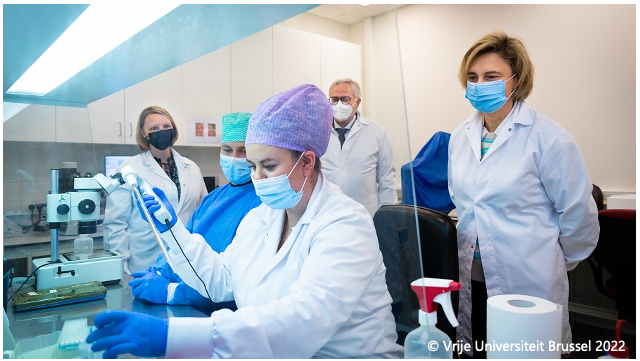Prof. Ellen Goossens from the Vrije Universiteit Brussel (VUB), in cooperation with the Universitair Ziekenhuis Brussel (UZ Brussel), received the ethical approval to re-implant previously frozen testicular tissue in male cancer survivors who lost their fertility because of childhood cancer treatments. If successful, sperm cells will develop in the implanted tissue to restorethe fertility ofthese patients.

Childhood cancer survival rates have increased in developed countries because of advances in cancer treatments. However, cancer treatments can be detrimental to germ cells and result in about 30% in permanent infertility1. Because they do not yet produce sperm for sperm banking, the removal and freezing of testicular tissue for storage is currently the only procedure to preserve the reproductive function of these prepubertal boys. Re-implantation of frozen testicular tissue later in life is a promising fertility preservation strategy for these patients. For instance, frozen testicular tissue re-implanted under the skin of the scrotum of non-human primates (rhesus macaque), resulted in fertility-competent sperm and birth of a baby 2. This milestone was discussed in NYRA’s previous press highlight.
The UZ Brussel started to offer testicular tissue banking in 2002 and has stored tissue from approximately 130 prepubertal boys. Globally, samples have been stored from more than 1000 patients1. Meanwhile, the Biology of the Testis (BITE) lab of Prof. Ellen Goossens performed pioneering work in the freezing procedure of the testicular tissues, but also their transplantation3. In addition, BITE is investigating the long-term effects of testicular tissue removal: “A study is currently underway in which boys who have had tissue banked are further followed up so that we can investigate whether their puberty is proceeding normally and whether they will be fertile in adulthood.” After successful results, the ethical committee has now granted BITE and the UZ Brussel with the, worldwide, first approval to re-implant previously frozen testicular tissue in male cancer survivors. “We can implant the tissue back into the testicle when one of the patient desires it” says Prof. Ellen Goossens. Therefore, the first re-implantation is expected this year.
References
- Goossens E, Jahnukainen K, Mitchell RT, et al. Fertility preservation in boys: recent developments and new insights. Hum Reprod Open. 2020.
- Fayomi AP, Peters K, Sukhwani M, et al. Autologous grafting of cryopreserved prepubertal rhesus testis produces sperm and offspring. Reprod Biol. 2019.
- Baert Y, Braye A, Struijk R, et al. Cryopreservation of testicular tissue before long-term testicular cell culture does not alter in vitro cell dynamics. Fertil Steril. 2015.
